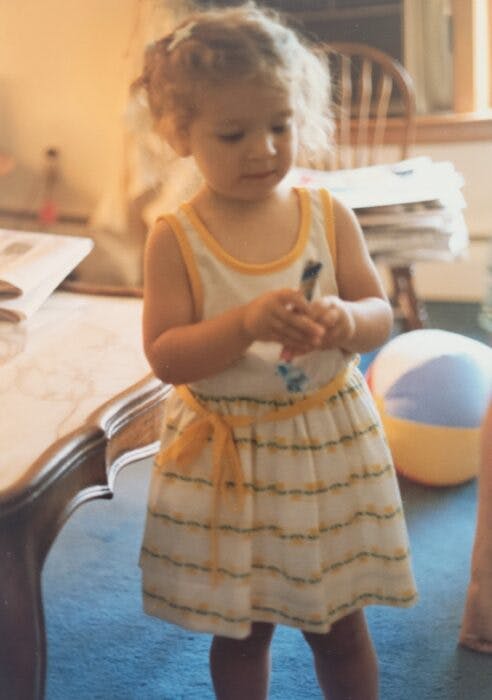Looking back on my childhood I see glimpses of what I now know to be OCD peeking in. I was a chronic nail-biter, anxious by nature. My best friend was my cat named Bishop. I loved Bishop and worried myself sick over his well-being. He would go indoors and outdoors.

In the evening I would call him in for the night. I can remember that there were times when it would be past my bedtime and I would feel I needed to sneak up and try and call him in if he hadn’t already come in for the night. I even stayed up all night on occasion being so concerned that he was in danger. I have always experienced anxiety.
Before there was a diagnosis
Many years before I received the diagnosis of Obsessive Compulsive Disorder (OCD) I knew I struggled with something. I always just chalked it up to general anxiety. Just before marrying my husband over 11 years ago, he did the best thing he could have done. He told me that I needed to see someone and get help for what I was experiencing. He knew I was experiencing mental illness even before I really understood it.
My life was becoming more scary and confusing each day. I was exhausted from the constant train of thoughts plowing through my brain.
Being a very analytical thinker and a lawyer I knew that something was amiss, but I just couldn’t pinpoint it. I had nothing to relate to the symptoms I was experiencing. Society doesn’t talk about the things I was experiencing when they talk about OCD, at least not at this time in my life. I never knew what it was. I thought it was just what you see on television and in movies. I didn’t fit into that mold.
I didn’t recognize it at the time but I was having classic symptoms of OCD. I had normal courtroom anxiety like many of my peers. It is a high-stress environment, so this is part of the job. What was unusual though is that in the middle of proceedings intrusive images of the courtroom flashed in my mind. Instantly I became ashamed and felt distressed. I wondered why this happened. There I was in the middle of an argument for my case and I was having intrusive images and distressing thoughts. This had a substantial impact on my ability to focus on the task at hand.

Often times these cases are high stakes, it is imperative that you concentrate and stay present. This became debilitating. When I was feeling overwhelmed or stressed, the intrusive thoughts and images would often increase, leaving me off guard.
Adding to my stress was the way in which the legal system perceives mental health issues. Only in 2019 was the question, on the character and fitness test for becoming an attorney “do you have any mental health issues?” in my state of residence finally removed. This is a huge step in the right direction and there is still so much more work to be done.
The final straw
I really started to notice that the intrusive thoughts were impacting my well-being when I started to experience them often. I had some real-life experiences that undoubtedly influenced the nature of the themes in which OCD showed up in my life. I became laid off from my job. This is really when a lot of the underlying emotions came to the forefront. I was dating my now husband. I was having a difficult time leaving my house. I was hyper-focused on my dog, Pierre at the time. I was constantly checking on him to ensure he was okay. I locked the house doors and was continually rechecking locks. I was heading out of state and my partner was asleep. I headed out on my long road trip, several hours away. I couldn’t shake the feeling that I had left the door open and my beloved dog could get out and get hurt. I tried calling my partner but he was still asleep. I tried to forge on, I had already completed several hours of the trip. The anxiety was too great. I turned around and went all the way back only to find that the door was indeed shut and Pierre was fine.

I was about 3 hours late for this event. When I finally arrived, very late, I was embarrassed. I made excuses for myself. It was a very irrational moment but it felt so real at the time. I knew I needed to find out what was happening to me. I had just spent a huge chunk of time lost in anxiety and fear. This was a defining moment in my life. I realized then and there- I had gone too far. I had let this thing, whatever it was, get out of hand.
I finally reached out for help. The first therapist that I had was able to diagnose me with Obsessive Compulsive Disorder (OCD) but admittedly did not have any idea how to treat this disorder. We were engaged in traditional “talk therapy” at that time. I now know that this was actually more harmful to my problem than it was helpful. It would take a couple more therapists until I landed on the right one. This therapist knew OCD and Exposure and Response Prevention (ERP). I continue to see this therapist even today. I can say that I am living in recovery. I am in the maintenance stage. I like to think of it as I attend therapy for regular tune-ups.
ERP: A daily practice
In spite of all the progress I have made throughout treatment, I still love to hate ERP. I still see ERP as scary. Even after all of these years, I do not like it. I look at it as if the rewards are worth it. It’s like when children are younger and you try to get them to eat their vegetables. They may hate it, but you know that in the end, it is good for them. That is how I feel about ERP. I don’t like it and I know it is the very thing that is good for me.
I say “I hate OCD all the time”. I hate the disorder, I hate that I have it and I wish I didn’t. At the end of the day though this is something I have to deal with. I have to face it head-on so that I can live the life I want to live and live in recovery.
Learning about what OCD actually is has been so beneficial. I think that there is such a public misconception about this disorder in particular. It tends to be seen as a quirky personality trait rather than the serious and life-altering disorder that it is. I would like to see this change. I have been learning how to recognize whether OCD is at play in my life earlier. I will ask myself “is this OCD?” Then I make the decision to go about what I need to do. Education has been so important to help me manage my life. I have found that the more consistent I am in ERP the easier it becomes. It is a lifelong practice, not something I do once and then stop. I continually face my fears using the tools of ERP.
I think about all the years that I went without treatment and I often wonder why. Looking back I think it was a combination of taboo the thoughts were and the perceptions that I held about mental illness. Growing up I had received the message through media and society that mental illness is bad. I had images of being locked up in a mental hospital somewhere, all alone. As I became older and started my career to being an attorney these messages of shame continued to grow.
I think more advocacy for not just OCD, but all mental illnesses is needed.
Perhaps if there had been more of this in the early days that I struggled, I could have received help sooner. Maybe I wouldn’t have been so embarrassed. My hope is that through advocating and telling my journey, as a successful career woman who has achieved great things, others can recognize that they can overcome OCD too.
I have also been diagnosed with co-morbid disorders which are not uncommon for someone with OCD. I continue to live my life to the fullest in spite of the obstacles I have had to overcome. I refuse to let any mental illness stop me from my future. I hope to continue to be an advocate and a voice in my community and field for anyone who experiences any form of mental health issues. The more I speak up and raise awareness, my hope is that more people will feel safe getting the help they need.

